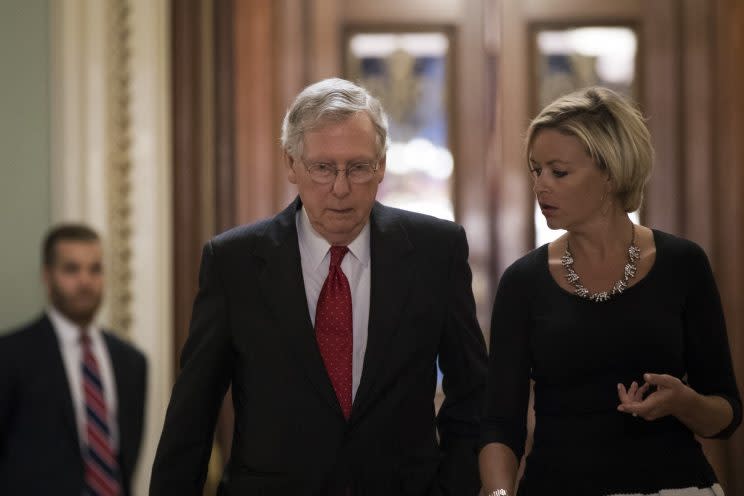In creative gambit, GOP senators ask House not to pass their own health care bill

WASHINGTON — Republican senators say they want assurances that their House colleagues won’t push the Senate’s “skinny repeal” bill into law before first fixing the legislation in a joint conference committee.
The development comes just hours before Senate Majority Leader Mitch McConnell, R-Ky., is expected to kick off a late-night vote-a-rama that will eventually lead to a vote on the skinny repeal bill.
“I want to be on record saying, … ‘If you passed it as a stand-alone proposition, it would destroy the insurance markets and we would own the failure of Obamacare,” Sen. Lindsey Graham, R-S.C., told reporters Thursday of the bill his caucus is poised to vote on later that night.
Republican senators are considering passing a stripped-down, partial repeal of Obamacare’s individual and employer mandates that many of them acknowledge would cause premiums in the individual markets to spike. But, the senators are pitching this move as simply the next step in a longer process that will result in a better health care system.
Senators want to make sure the House won’t simply take up that skinny repeal and send it directly to the president, which would dodge what’s sure to be a contentious conference committee to work out differences between the chambers’ two bills. The House passed a more comprehensive repeal-and-replace bill in May.
“I just want to make sure it isn’t just [on] a one-way trip to the House,” said Sen. Mike Rounds, R-S.D.
In a conference committee, provisions will be added to make the skinny repeal a fleshed-out repeal-and-replace bill, they say. The Senate is using a special budget reconciliation process that only requires 50 votes to pass and constrains them as to what they can include in the legislation.
“It’s a means to an end to keep this conversation going, engage the House and get this to conference,” said Sen. Steve Daines, R-Mont., Thursday. “The ‘skinny’ bill in my opinion is almost like a motion to proceed, it’s a vehicle to keep it going forward.”
But there’s no guarantee the House would not simply take up the skinny repeal and pass it, since the request to go to a conference committee must, for technical reasons, originate in the House.
Sen. Bob Corker, R-Tenn., said members wanted assurances that the House was on the same page and would agree to a conference committee where the issues with the bill would get ironed out. He said he believed those would be forthcoming.

“I think they’ll have more assurances that this is a pathway to conference,” Corker said.
Rep. Mark Meadows, R-N.C., the leader of the House’s influential conservative Freedom Caucus group, told a Bloomberg News reporter that the caucus would not pass the bill without a conference committee. Speaker Paul Ryan, R-Wis., said Thursday morning he was waiting to see what the Senate passed.
It’s unclear if McConnell has the votes right now to pass the measure. Sen. John McCain, R-Ariz., told reporters he is not yet supportive of the plan, and Graham said he would vote against it if he finds out that his amendment to block grant Medicaid does not meet reconciliation rules. Other key senators say they’re undecided, including Sen. Shelley Moore Capito, R-W.Va. and Sen. Lisa Murkowksi, R-Alaska.
Rounds floated the idea of including a delay in implementation of the skinny repeal as a “safety valve” in case the House really does pass it.
“Delay the implementation so even if the House just accepts it, you’ve still got some breathing room to go back in and fix the markets,” Rounds said. “That’s a safety valve that we [in] the Senate should be looking at.”
It’s unclear if a delay in implementation — or a “skinny-repeal-and-delay” — is under serious consideration, however. Sen. Orrin Hatch, R-Utah, said he didn’t think the delay idea had much traction in the conference. And Rounds said later Thursday that he had assurances from House members that they would not pass the bill into law.
McConnell is still working through how to make the stripped-down bill save as much money as the House plan, a requirement for it to pass the chamber with just 50 votes.
_____
Read more from Yahoo News:


